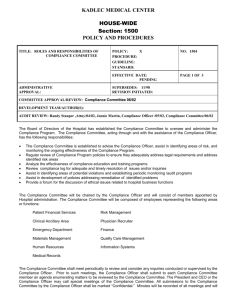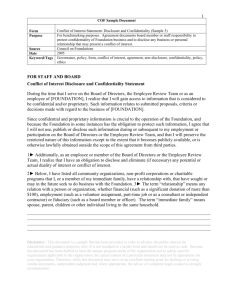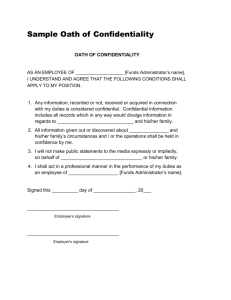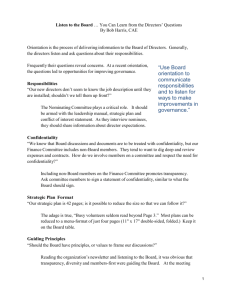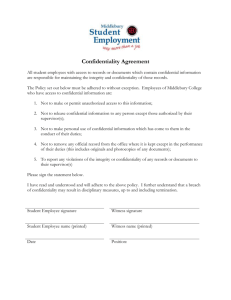Code of Conduct - Deposit Insurance Corporation of Ontario
advertisement
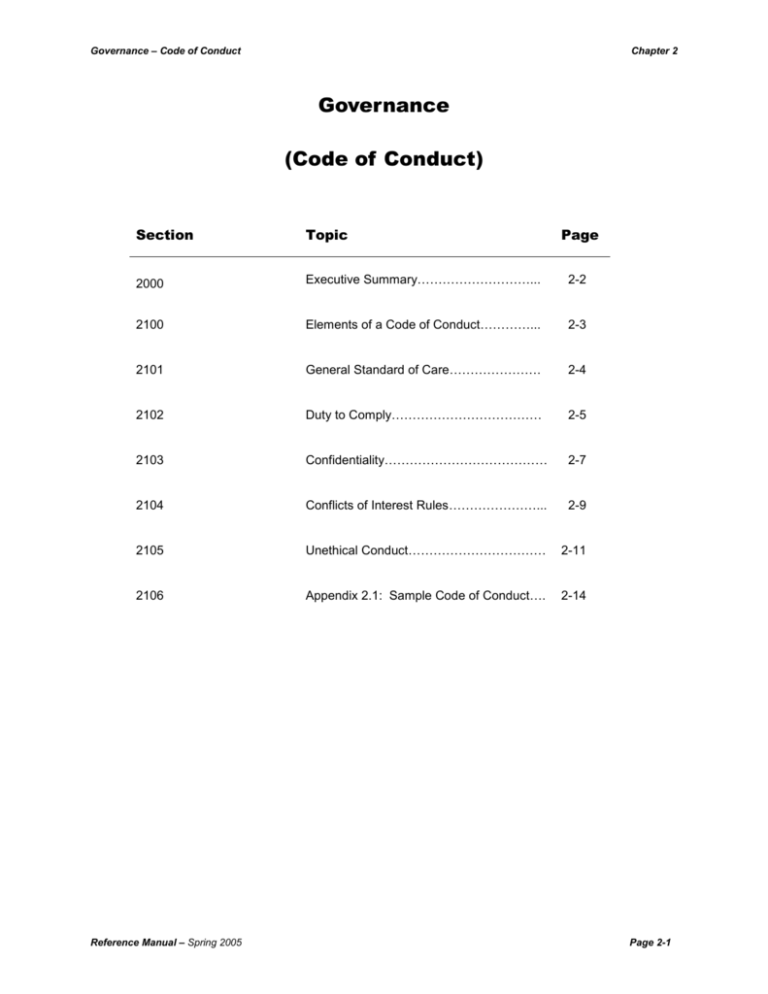
Governance – Code of Conduct Chapter 2 Governance (Code of Conduct) Section Topic 2000 Executive Summary………………………... 2-2 2100 Elements of a Code of Conduct…………... 2-3 2101 General Standard of Care…………………. 2-4 2102 Duty to Comply……………………………… 2-5 2103 Confidentiality………………………………… 2-7 2104 Conflicts of Interest Rules…………………... 2-9 2105 Unethical Conduct…………………………… 2-11 2106 Appendix 2.1: Sample Code of Conduct…. 2-14 Reference Manual – Spring 2005 Page Page 2-1 Governance – Code of Conduct - Executive Summary Section 2000 Executive Summary A Code of Conduct documents the rules and policies that govern the business and ethical conduct of directors, committee members and staff (i.e. officers and employees). The scope of a Code of Conduct includes the individual legal duties of each director, committee member and staff member, as well as identifying unlawful or prohibited conduct. The Code forms part of the credit union's board level policy. Therefore, its form and content must be reviewed and approved by the board. All directors, committee members and staff must be familiar with the contents of the Code, and agree to abide by its terms (preferably in writing). It is important that ethical and lawful conduct be evidenced in all credit union practices, in order to protect the reputation and credibility of the organization and preserve community trust. Establishing a proper Code of Conduct is the first step in demonstrating such conduct. Reference Manual – Spring 2005 Page 2-2 Governance – Code of Conduct - Elements of a Code of Conduct Section 2100 Elements of a Code of Conduct A Code of Conduct should address all important ethical issues and legal duties with respect to the behavior and conduct of individual directors, volunteers and staff members of the credit union. It should therefore address the following issues: general standard of care of directors and officers; compliance with all applicable laws; confidentiality; conflicts of interest; restricted party transactions; unethical conduct. These elements are each discussed below in the materials which follow. A sample Code of Conduct is attached as an appendix to these materials. The Code of Conduct, whether developed by management, the credit union's lawyers, or simply adopted from the Sample Policies, must be approved by the board. As well, it must be communicated to all directors, committee members, and staff of the credit union. This involves two recommended activities: Require all new directors, committee members and staff to review the Code of Conduct, and sign a declaration of ethical conduct acknowledging its contents. Annually, require all directors, committee members and staff to review the Code of Conduct, and sign a declaration acknowledging its contents. By signing a declaration, directors, committee members and staff acknowledge that they have read the Code, understood its contents, and agree to abide by its terms. It is important that they also be given the opportunity to review the Code of Conduct prior to signing the declaration, and be given the opportunity to raise questions on its significance with either an officer or staff member in charge of implementing the Code. Reference Manual – Spring 2005 Page 2-3 Governance – Code of Conduct – General Standard of Care Section 2101 General Standard of Care The general duty of care required of directors, officers and committee members of credit unions, is expressed in section 144(1) of the Credit Unions and Caisses Populaires Act, 1994 (the Act), which states the following: "Every director, officer, and member of a committee established under this Act shall exercise the powers and discharge the duties of his or her office honestly, in good faith and in the best interests of the credit union." The standard to which this duty is to be held, is set out in section 144(2) of the Act: "The director, officer or committee member shall exercise the degree of care, diligence and skill that a reasonably prudent person would exercise in comparable circumstances." It is possible that an individual with specialized knowledge, education or work experience may be expected to fulfill the duties of his or her office in a particularly skilled manner in meeting this standard of care. For example, a director who is by profession a qualified lawyer may be held to a higher standard that reflects the additional qualifications which that director has, by virtue of his or her professional credentials. In order to mitigate against the risk of legal liability, the following practices are recommended to individuals holding senior positions in a credit union: Fully understand the scope of statutory and assigned authority and do not act beyond this scope. Keep informed of changes to DICO by-laws and provincial legislation and object immediately to incidents of contravention. Ensure that each action performed is in the best interest of the credit union, and is not for personal gain. Co-operate fully with FSCO and DICO in responding to their concerns, particularly on matters of statutory compliance and institutional risk. Keep abreast of legal actions taken against the credit union. Ensure controversial decisions involving conflict of interest are carefully documented. Review on-site verification reports, league reports and external auditors' reports to identify and correct operational weaknesses. Ensure that officers/employees are bondable, and may be relied upon. Ensure that sufficient access to material and resources is available to management and the board so that sound business and financial decisions can be made. Develop a common organizational view prior to making a public comment regarding controversial issues that concern the credit union. Obtain director's liability insurance. Ensure that all significant policy matters have been approved by the board and implemented by management in compliance with DICO By-law No. 5 and the Act. Reference Manual – Spring 2005 Page 2-4 Governance – Code of Conduct – Duty to Comply Section 2102 Duty to Comply The Act and Regulations Directors, committee members, officers and employees have a duty to comply with the Act and Regulation 76/95. In this regard, they should obtain sufficient understanding of relevant legal duties and prohibitions under the Act and Regulation 76/95. The following schedule summarizes some of the sections under the Act which prescribe duties and responsibilities for directors, committee members, and staff. Readers should refer to the Act and Regulations for a complete description of their duties and obligations. Schedule 2.1 SUMMARY OF IMPORTANT CORPORATE GOVERNANCE LEGISLATION Act Regulation 76/95 Restriction on dividends s. 67 Qualification of directors ss. 91 and 92 Powers and duties of the board ss. 104 to 108 Executive committees s. 109 Duties of the credit committee ss. 121 to 124 ss. 24 and 25 Duties of the audit committee ss. 137 to 139 s. 26 Duty of confidentiality ss. 142 and 143 Duty of care s.144 Duty to comply s.145 Liability of directors ss. 152 and 153 Business powers Part VIII Restricted party transactions Part IX Part X Offences Part XVII Non-Compliance Non-compliance with the Act can carry serious consequences for directors and officers, especially where it represents an offence under the Act. Any director, officer or agent of a credit union who commits an offence under the Act, authorized, or acquiesced to the offence, is liable to severe penalties. Penalties prescribed in the Act include a maximum fine of $100,000 or maximum imprisonment for two years for a first offence. In certain instances, directors, committee members and staff can be held jointly and severally liable to their credit union for their unlawful actions. Specifically, directors will be held jointly and severally responsible for losses resulting from their voting or consenting to the following unlawful resolutions: The sale of shares by directors, committee members or staff for consideration other than cash, contrary to section 59(1) of the Act. The issue of subordinated indebtedness contrary to section 186, for a consideration other than money (see section 153(1)). Reference Manual – Spring 2005 Page 2-5 Governance – Code of Conduct – Duty to Comply Section 2102 Illegal payments contrary to the Act, such as the redemption of shares or payment of a dividend where the credit union is insolvent, or where the redemption or payment would cause its insolvency (see section 153(2) for a complete list). Transactions with restricted parties, contrary to the Act and Regulations (see section 153(2)). Failure to divest of illegal investments, or illegal loans, upon an order by the Superintendent of Financial Services (see sections 237 and 238). Other Acts and Common Law The credit union, and its directors, committee members and officers, have responsibilities and duties under other Acts, and under the common law as well, including: The Ontario Human Rights Code, which deals with discrimination in the treatment of employees and in hiring. The Employers Health Tax Act, which requires the credit union to remit health taxes. The Income Tax Act, Canada Pension Plan and Employment Insurance Act, which require the credit union to remit income taxes and Canada Pension Plan and Employment Insurance premiums. The Pay Equity Act, which ensures that staff and officers receive equitable compensation. The Consumer Protection Act which sets out the disclosure requirements for borrowing costs for all credit arrangements The Consumer Reporting Act, which ensures that proper information, is communicated to members about the credit union's products and services. The Employment Standards Act, which ensures that the credit union meets standards of fair employment. The Bankruptcy and Insolvency Act, which requires the credit union to observe the rights of debtors and creditors in dealing with the assets of a bankrupt individual, and provincial creditor protection legislation. The Ontario Health and Safety Act, which sets out employers' duties regarding the health and safety of employees within the workplace. Employment case law, which governs cases such as wrongful dismissal, or the lack of a proper notice period. The Personal Protection and Electronics Documents Act (PIPEDA) which requires the credit union to observe privacy legislation surrounding the collection, use and disclosure of personal information of its members and employees and information obtained in the normal course of business. The Proceeds of Crime (Money Laundering) and Terrorist Financing Act which requires the credit union to implement a compliance regime for identifying and reporting large and suspicious transactions. For a complete list of relevant laws, credit unions should contact their lawyer. Reference Manual – Spring 2005 Page 2-6 Governance – Code of Conduct – Confidentiality Section 2103 Confidentiality Statutory Duty Rules of confidentiality are prescribed in section 142 and 143 of the Act. These rules extend to every director, committee member and officer of a credit union. The following schedule summarizes the subject matter of each rule under the Act. Readers should refer to the Act for a complete description of their duties regarding confidentiality. Schedule 2.2 SUMMARY OF CONFIDENTIALITY LEGISLATION The Act Duty to keep information confidential. Section 142(1) Prohibition against the use of confidential information for an individual's benefit or advantage. Section 142(2) Specific duty of confidentiality regarding members' transactions. Section 143(1) Exceptions where information may be disclosed. Section 143(2) Sound Practices Sound business and financial practices require that individuals hold in strict confidence all organizational and member transactions except as permitted under the Act, the applicable by-laws, or by compulsion of the law. In addition to the rules under the Act, the following materials provide guidance regarding the use of confidential information. Confidentiality Agreements Prior to assuming duties which include the right of access to member records, directors, committee members and staff should be required to sign a confidentiality agreement. This agreement is a written pledge of an individual to hold private matters in strict confidence. Refer to Appendix 2.1 for a sample Declaration of Ethical Conduct, which includes the requirement for confidentiality. Protection of Records Each credit union should establish administrative and physical controls to ensure the protection of records from unauthorized access or disclosure, and from physical damage or destruction. The controls instituted should be related to the degree of sensitivity of the records but at a minimum would ensure that: records are protected from public view; the area in which the records are stored is supervised during all business hours to prevent unauthorized persons from entering the area or obtaining access to the records. Conduct of Employees The general manager of each credit union should be responsible for ensuring that employees subject to his/her supervision are advised of the serious-ness of maintaining confidentiality. Employees should be made aware of their responsibilities to protect the security of personal information, to ensure its accuracy, relevance, and completeness, and to avoid unauthorized disclosure either orally or in writing. With respect to each record maintained by the credit union, employees of the credit union should: Reference Manual – Spring 2005 Page 2-7 Governance – Code of Conduct – Confidentiality Section 2103 collect no information of a personal nature form individual sunless authorized to collect it to achieve a function (i.e. marketing activities, membership surveys) or to carry our a responsibility of the credit union; collect information, wherever possible and appropriate, directly from the individual to whom it relates; abstain from disseminating information concerning an individual's religious or political beliefs or activities, or his/her membership in associations or organizations. Violations of Confidentiality Violations of confidentiality which should not be practiced include the following: Providing (selling, lending or otherwise making available) to persons unauthorized, copies of the Register of Members or the membership mailing list. Indiscriminate discussions (i.e. gossip) about the transactions of a member, or the business affairs of the credit union, to persons not entitled to the information. Selection of unsuitable locations for board or committee meetings or employee discussions of confidential matters, such as public places (i.e. restaurants or elevators). Mailing confidential information to the business office of the recipients when the intact delivery of the confidential information is not assured. Reviewing confidential information in a manner which, due to neglect, lack of control, or carelessness, results in unauthorized persons also seeing this information (i.e. reading in public places or leaving confidential material unattended). Employing volunteers to assist in clerical duties of the credit union without instructing them on the rules of confidentiality. Exceptions to Rules of Confidentiality The following individuals have the right of access to confidential information from the credit union: the Superintendent of Financial Services; DICO or its agents, and the stabilization authority of the credit union; an affiliated league for examination purposes; duly appointed auditors or lawyers of the credit union, or a duly appointed liquidator; a member inspecting his or her own account. Confidentiality of information regarding members is also qualified by: compulsion of the law; public duty to disclose; the necessary defence of the credit union. Although they are not legally obligated to do so, credit unions are permitted under section 143(2) to provide confidential information to: an affiliated league providing consultation services; another financial institution in the course of conducting business which involves the use of confidential information; a credit grantor or reporting agency, if the information is on the member's credit worthiness. Reference Manual – Spring 2005 Page 2-8 Governance – Code of Conduct –Conflict of Interest Rules Section 2104 Conflicts of Interest Rules Each and every director, committee member, officer or employee has an obligation of loyalty to the credit union and must subordinate their personal interests when they conflict with or threaten to conflict with the best interests of the credit union. Directors and officers hold positions of respect within their organization, and have been given the unique opportunity to serve, to counsel and to lead. By acceptance of their respective positions, they have assumed fiduciary, legal and moral responsibilities to conduct the affairs of their credit union for the best interests of the members at large, and to avoid conflicts of interest, real or implied. Conflicts of interest rules are set out in the Act (see sections 146 to 149). The Code of Conduct must acknowledge these rules, and should also incorporate policies to safeguard against violation of them. Disclosure Generally, individuals must disclose the nature and extent of the benefit or consideration which they will derive, directly or indirect-ly (i.e. through a relative or associated company) as a result of such contract or transaction, to the extent that such information is within their knowledge or control. The duty of disclosure requires that the conflict of interest be revealed at the earliest possible time. The following schedule summarizes the subject matter of each rule under the Act. Readers should refer to the Act for a complete description of their duties regarding conflicts of interest. Schedule 2.3 SUMMARY OF CONFLICTS OF INTEREST LEGISLATION The Act Disclosure of conflicts of interest Section 146 Restrictions on voting rights for an interested party Section 147 Avoidance Section 148 Acting for the credit union Section 149 Restricted party transactions (see also Part X of the Regulation 76/95) Sections 207 to 210 It is recommended that the detailed particulars of a conflict of interest disclosure be recorded in the board minutes, for the protection of all directors, together with a record of the concerned individual absenting himself or herself from the discussion of the transaction. If a conflict of interest is not disclosed by the relevant party, the contract or transaction may be set aside by the courts, upon application by a member or the credit union. Additionally, failure to declare a conflict of interest constitutes sufficient grounds for removal from office. Restricted Party Transactions With respect to restricted party transactions, full disclosure of material transactions should be recorded in the board's minutes and should be transacted in accordance with legislated restrictions. Reference Manual – Spring 2005 Page 2-9 Governance – Code of Conduct –Conflict of Interest Rules Section 2104 (See sections 207 to 210 of the Act, Part X of Regulation 76/95, and FSCO Interpretative and Administrative Bulletin 1/96 (page 4)). Capacity of Director Under the Act, a director is prohibited from being a member of the credit committee. Directors (and committee members) are also prohibited from receiving compensation for providing professional services, such as legal, auditing or management services (see section 149 of the Act). This does not preclude directors from receiving a nominal fee (usually called an honorarium) for their work and contribution to the credit union. This practice is common in smaller credit unions that are unable to afford management staff. Where a director provides management or consulting services on a volunteer basis to the credit union, care should be taken to limit the extent of those services offered. The board provides an independent check on the affairs of management; as a result, these two functions should be performed by independent persons. Director and Staff Loans The board of directors should establish a policy which regulates the conditions under which the credit union's directors, committee members, officers and employees may be granted preferential loans or services. Notwithstanding the preferential terms, loan qualification for directors, committee members and staff should be based on the normal financial tests and other criteria applied to arm's length borrowers and lending decisions should be in adherence to sound lending practices prescribed in Chapter 5 on Credit Management. Whenever a director, committee member or staff loan is being approved, the individual's cumulative borrowings from the credit union, and from other sources must be disclosed to those authorizing the loan, as should any loan arrears to the credit union. Each director, committee member or officer loan which exceeds, or if granted would exceed, that member's total shares and deposits must without exception be approved by the board and the credit committee of the credit union (see section 208 of the Act, and FSCO Administrative and Interpretive Bulletin 1/96)). Preferential rate loans to staff, if any, should be treated as part of the overall compensation package offered to employees, and not as gratuitous benefits additional to salaries. Financial statement disclosure of preferential rate loans to staff (i.e. with respect to related party transactions) should be made whenever a material income differential is attributable to these loans. Other Conflicts The purpose of identifying conflict of interest situations is to prevent the credit union from placing the interests of a few members ahead of the interests of all members. This general rule should be used by directors and officers to identify other situations of conflict not specified in this section, and to develop policies which reduce the risk that such situations pose. To avoid conflicts of interest, directors, committee members, officers, and employees must do more than merely act within the law. They must conduct their affairs in such a manner that their performance will at all times bear public scrutiny. The appearance of conflict of interest as well as the conflict itself must be avoided. Reference Manual – Spring 2005 Page 2-10 Governance – Code of Conduct – Unethical Conduct Section 2105 Unethical Conduct Other forms of unethical or inappropriate conduct which should be prohibited either in policy or directly in the Code of Conduct include: abuse of the personal privileges of office; secret commissions; inappropriate gifts; acts of slander and libel; nepotism; employee discrimination and harassment; criminal acts; reporting of questionable and fraudulent acts. These are each discussed in turn below. Additional situations of unethical conduct, not specified above, may arise, and should be addressed systematically by the credit union through board policy. Abuse of the Personal Privileges of Office Reasonable limits should be established regarding the personal privilege which a director or officer of a credit union may exercise. Land, buildings, equipment, supplies and other materials leased or owned by the credit union are in existence for the purpose of dispensing member services, promoting the credit union, and to aid the staff in the performance of their duties. The conditions under which an officer may be allowed to use, loan, or remove property and possessions of the credit union for his personal benefit should be regulated so that the protection of property and the rights of general members are not over-looked. Secret Commissions A secret commission is the unauthorized receipt of a reward, advantage or benefit of any kind by a director, officer, employee or committee member in return for favoured treatment by the credit union. Demanding, accepting, offering or agreeing to accept a secret commission is a criminal offence, punishable by imprisonment. The acceptance of a secret commission is also a violation of fiduciary obligations owed to the credit union, the breach of which may result in the loss of all sums wrongfully received and liability for punitive damages. Credit unions should adopt a policy prohibiting the direct or indirect receipt of any reward, advantage or benefit by any employee, officer, director or committee member from suppliers or customers doing business with the credit union. Policy should require staff to notify their superior in writing if they have been offered a reward, advantage or benefit; the notification should be shared with the board of directors for consideration of further action to be taken. Accepting Gifts No director, committee member, officer, or employee should accept any gift, hospitality or favour offered or tendered by virtue of the official's position with the credit union, where the gift, hospitality or favour possesses any one of the following characteristics: is in the substance or form such that an impartial observer would construe it to be an improper incentive; places the official under an actual or implied obligation; Reference Manual – Spring 2005 Page 2-11 Governance – Code of Conduct – Unethical Conduct Section 2105 has a value equivalent to or greater than a dollar amount established by the board (e.g. $100); is in the form of cash or cash equivalent. Where it is deemed that small tokens of appreciation (e.g. a box of chocolates) may be given to employees by members/suppliers, as a gesture of goodwill, a dollar limit to these token gifts should be prescribed in the written policies of the credit union. Public Officials When dealing with public officials whose responsibilities include the business of credit unions, acts of hospitality should be of such a scale and nature so as to avoid compromising the integrity or reputation of either the public official or the credit union. Such acts of hospitality should be undertaken in the expectation that they could well become a matter of general knowledge and public record. Acts of Slander and Libel Any actions which resemble slander (spoken defamation) or libel (written defamation) of members or competitors of a credit union should be prohibited. Defamation consists of unjustified injury of reputation. Spoken statements reflecting adversely on a member or a competitor's honesty, solvency, ambition or concern for public welfare constitute slander. Similarly, written advertising statements which reflect negatively on the quality of a competitor's products or services constitute libel. No legal liability arises from "puffery", i.e. exaggerated statements such as "our product is best"; however, direct and unsubstantiated criticism launched against a competitor is a legal offence. Nepotism Nepotism and anti-nepotism, is defined as favouritism or prejudice shown to a relative, generally in connection with providing employment. Only objective criteria, such as skill and performance, should be used in hiring and advancement decisions. One approach to facilitating objectivity is the establishment of an interview panel consisting of one management representative and a minimum of two directors who are not related to the employment candidate. This same panel should interview all candidates competing for the same position. It is advisable that related persons (including those in a common law relationship) not be placed in a supervisory/subordinate reporting relationship. Employee Discrimination and Harassment In accordance with the Ontario Human Rights Code, a credit union must not engage in any employee discrimination on the basis of the following: race, ancestry, religion, place of origin, colour, ethnic origin, citizenship, creed, sex, sexual orientation, age, marital status, family status, or disability. The right to be free from discrimination in employment is not confined to the hiring stage, but extends to all aspects of the employment relationship, including employment testing, onthe-job training, working conditions, transfers and promotions. Only objective criteria, such as skill and performance, should be used when making hiring and advancement decisions regarding employees. Credit unions recruiting new employees should not include any questions on their employment application forms which seek to classify individuals according to any of the prohibited discriminatory categories. Harassment in the workplace, whether it be sexual, racial, directed against the disabled, or on some other prohibited ground, should be a matter of concern for management. In most instances, an employer will be held liable for the harassment of his or her employees by other employees. In Reference Manual – Spring 2005 Page 2-12 Governance – Code of Conduct – Unethical Conduct Section 2105 order to reduce the likelihood of harassment, a credit union should adopt a formal policy and publicize its contents to all employees. The policy should identify behaviour which constitutes harassment. A complaint procedure should be set out indicating where, harassment complaints should be addressed (usually a member of management), and the disciplinary action which will result if any employee is found to have harassed another person. Criminal Acts Criminal acts committed by directors, committee members or staff represent sufficient grounds for immediate termination; however, management should obtain legal advice or consult its league prior to confronting the suspect and seeking restitution. Criminal activity can includes acts such as secret commissions, extortion, embezzlement, fraud, false presence (e.g. cheque kiting), forgery or theft. All criminal acts must be reported to the police. It is recommended such acts also be reported to the audit committee, the Superintendent of Financial Services, and the appropriate bonding company, where that officer or staff member is bonded. The Reporting of Questionable or Fraudulent Actions It is the responsibility of directors, officers, employees and committee members to report their awareness of any situation which might adversely affect the reputation of the credit union. This would include any questionable, fraudulent or illegal events or material actions in violation of credit union policy which comes to their attention. If such events involve employees, the matter should be reported to the appropriate senior employee/officer, who in turn should report the matter to the audit committee. If the matter involves the general manager, directors or committee members, the matter should be reported to the audit committee. The audit committee should always be informed of questionable, fraudulent or criminal acts. The committee must report all such acts, as well as any violations of the Act, Regulation 76/95 and the by-laws to the Superintendent of Financial Services (see section 138 of the Act). Every director, officer, employee or volunteer is expected to comply promptly with any request from internal and/or external auditors for assistance and to provide full disclosure of any situation under investigation. Reference Manual – Spring 2005 Page 2-13 Governance – Code of Conduct – Appendix 2.1 Section 2106 Appendix 2.1: Sample Code of Conduct Purpose The purpose of this Code of Conduct is to establish the rules governing the business and ethical conduct of the directors, officers, employees and volunteers of ABC Credit Union Limited. It is important that ethical and lawful conduct be evidenced in all business practices, in order to protect the reputation of the organization and preserve community trust. The board has adopted this policy and the board shall review this policy annually. General Duties of Care Each director, officer, employee or volunteer of the credit union shall exercise the power and discharge the duties of his/her office honestly, in good faith, and in the best interests of the credit union, and shall comply with the applicable by-laws, guidelines, policies and procedures of ABC Credit Union Limited. Directors, credit committee members and officers shall also comply with the Credit Unions and Caisses Populaires Act, 1994 (the Act), Regulation 76/95 prescribed therein, the by-laws of DICO and the terms and conditions set out in the policy of deposit insurance issued by DICO. Confidentiality Each director, officer, employee or volunteer must use utmost care and discretion in the handling of confidential information and other information not normally available to the public, generally coming to them by reason of their directorship, office or employment. Such information shall, subject to certain limited circumstances, not be disclosed to third parties and shall not be used for personal benefit or for the benefit of family, friends, or associates. In respect of information regarding members' transactions with the credit union, a director, officer, employee or volunteer may disclose such information in the following circumstances, pursuant to section 143 of the Act: (a) to a person acting in a confidential or professional relationship to the credit union including an employee of a league in which the credit union is a member; (b) to a financial institution with which the credit union has transactions that may involve confidential matters; (c) to a credit grantor or to a reporting agency, if the disclosure is for the purpose of determining the credit-worthiness of the member; (d) to the Superintendent of Financial Institutions, deposit insurer and the stabilization authority for the credit union; (e) to any other person entitled to the information by law. Conflicts of Interest Each and every director, officer, employee or volunteer has an obligation of loyalty to the credit union and should subordinate his/her personal interest when they conflict with or threaten to conflict with the best interests of the credit union. Each and every director, officer, employee or volunteer of the credit union shall declare all actual or potential material conflicts that may arise between their duty to (i) the credit union and (ii) their personal obligations, other fiduciary duties or financial interests (direct or indirect). In the case of Reference Manual – Spring 2005 Page 2-14 Governance – Code of Conduct – Appendix 2.1 Section 2106 directors and officers, these conflicts shall be reported to the Chair, and in the case of employees and volunteers, to the person to whom they directly report. A director, officer, employee or volunteer should not engage directly or indirectly, as a director, officer, employee, consultant, partner, agent or major shareholder in any business or undertaking that competes with, does business with or seeks to do business with the credit union. The only exception to this is where the express written approval is given by either the general manager (in the case of an employee) or by the chair of the board of directors (in the case of an officer or director). A major shareholder is defined as a person who owns (directly or indirectly) more than ten per cent of the issued and outstanding equity of a company. With respect to restricted party transactions, full disclosure of material transactions shall be recorded in the board's minutes and will be transacted in accordance with legislated restrictions. To avoid conflicts of interest, directors, officers, employees and volunteers must do more than merely act within the law. They must conduct their affairs in such a manner that their performance will at all times bear public scrutiny. The appearance of conflict of interest as well as the conflict itself must be avoided. Accepting Gifts No director, officer, employee or volunteer shall accept any gift, hospitality or favour offered or tendered by virtue of the official's position with ABC Credit Union Limited, where the gift, hospitality or favour possesses any one of the following characteristics: (a) is in the substance or form such that an impartial observer would construe it to be an improper incentive; (b) places the official under an actual or implied obligation; (c) has a value equivalent to or greater than $100.00; (d) is in the form of cash or cash equivalent. When dealing with public officials whose responsibilities include the business of credit unions, acts of hospitality should be of such a scale and nature so as to avoid compromising the integrity or reputation of either the public official or the credit union. Such acts of hospitality should be undertaken in the expectation that they could well become a matter of general knowledge and public record. Maintenance of Credit Union Records Accounting, administrative and member records will be maintained in an accurate and timely fashion so as to present fairly and accurately the financial position of the credit union and of all member accounts for which it has responsibility. No undisclosed assets, liabilities or hidden funds of any sort are permitted. The Reporting of Questionable or Fraudulent Actions It is the responsibility of directors, officers, employees and volunteers to report to the credit union, their awareness of any situation which might adversely affect the reputation of the credit union. This would include any questionable, fraudulent or illegal events or material actions in violation of credit union policy which comes to their attention. If such events involve volunteers or employees, the matter should be reported to the appropriate senior employee/officer; if the matter involves the Reference Manual – Spring 2005 Page 2-15 Governance – Code of Conduct – Appendix 2.1 Section 2106 general manager, directors or committee members, the matter should be reported to the audit committee. Every director, officer, employee or volunteer is expected to comply promptly with any request from internal and/or external auditors for assistance and to provide full disclosure of any situation under investigation. ABC CREDIT UNION LIMITED DECLARATION OF ETHICAL CONDUCT I, [NAME], hereby acknowledge that I have carefully read and understood the credit union's Code of Conduct dated . I agree to faithfully abide by the terms of the Code of Conduct and to discharge my duties honestly and in good faith and in the best interests of the credit union. I will promptly and fully disclose any fiduciary relationship, activity or personal financial interest that might impair or affect my judgment or influence my decisions. I understand that I will be in possession of sensitive information relating to the credit union and its members and I will treat such information as confidential and will not disclose it to third parties or use it for my own personal benefit or the benefit of any other person. I will use the utmost care and discretion in the handling of such confidential information. Dated at_____________this________________day of _________, _________________________ ______________________________ Declarant Witness Reference Manual – Spring 2005 Page 2-16


